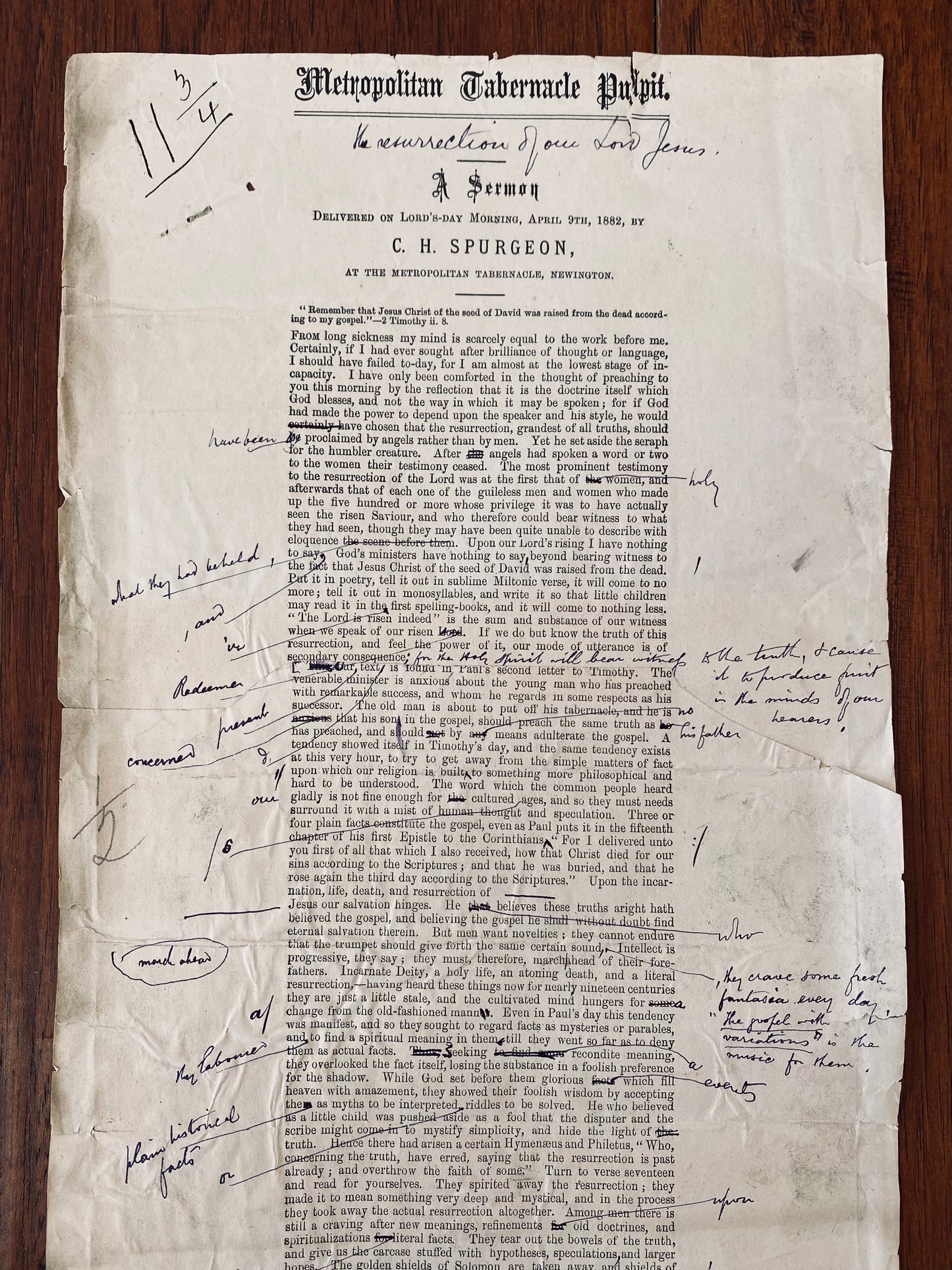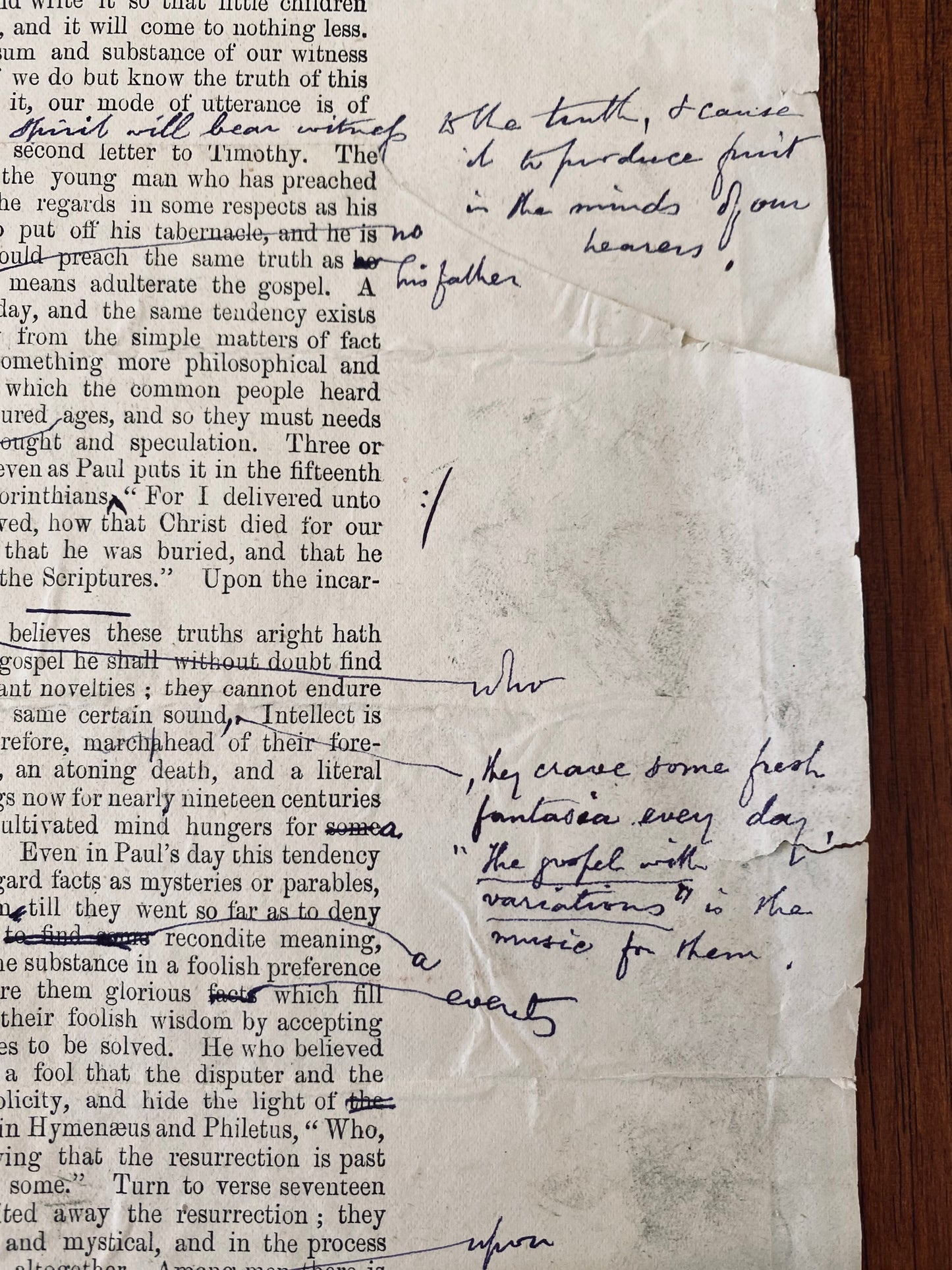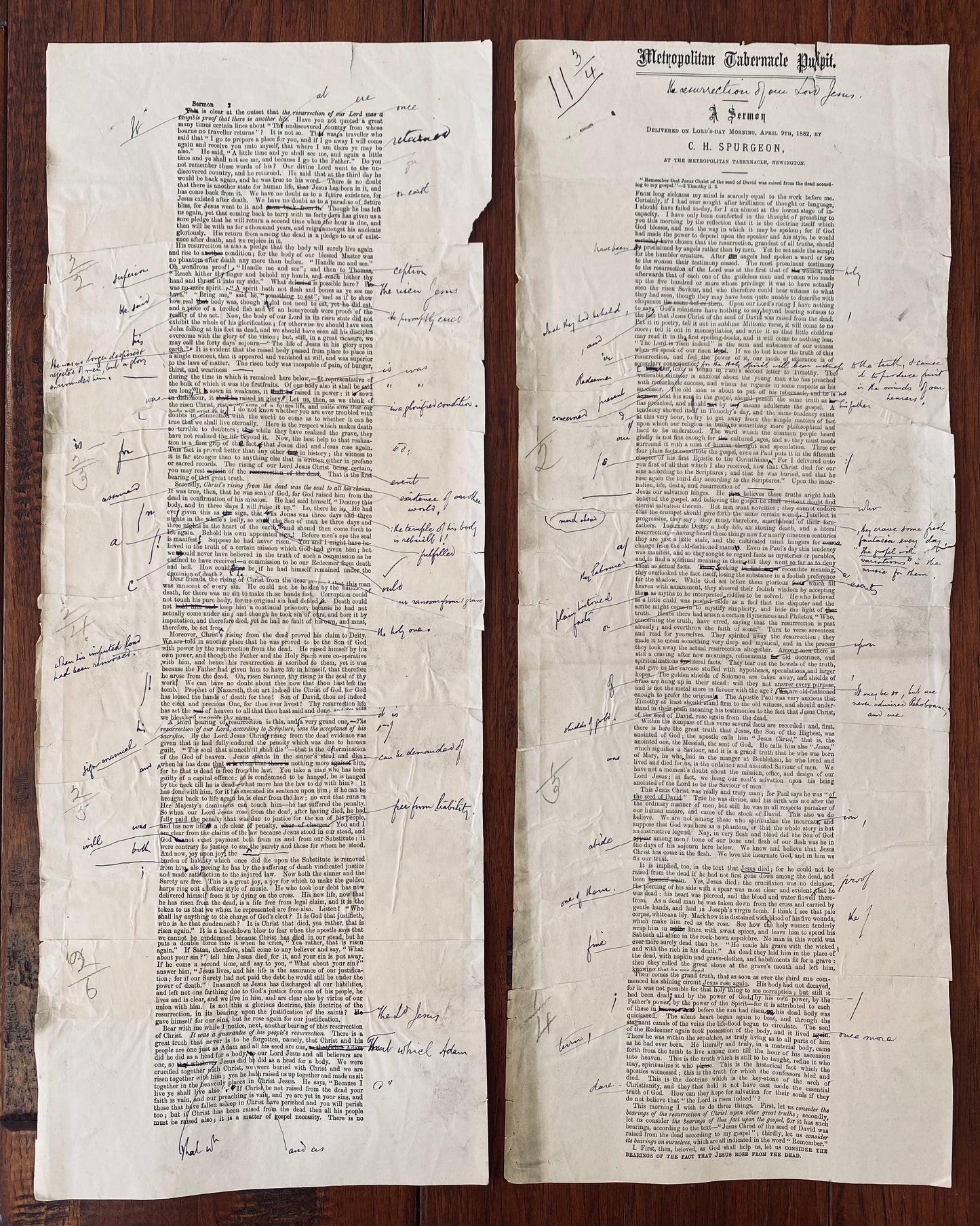Specs Fine Books
1882 C. H. SPURGEON. Autograph Printer's Galleys. The Resurrection of Our Lord Jesus - Jesus and His People as the Temple!
1882 C. H. SPURGEON. Autograph Printer's Galleys. The Resurrection of Our Lord Jesus - Jesus and His People as the Temple!
Couldn't load pickup availability
Wonderful, attractive piece of Spurgeonalia, and Spurgeon at his best, waxing eloquent on the power of the resurrection and the reality of Jesus and His people as the new temple where God Himself dwells.
On a personal level for Spurgeon, there was a special beauty in the resurrection of Jesus because, as he acknowledges, he was just returning from an extended sickness . . . making the promise of power, renewal, indwelling, and ultimately resurrection with Jesus especially poignant.
Each Lord's Day, Spurgeon's rhythm was the same. His secretary would take down his sermon long-hand as he preached [which, for many years, was from a simple 4 x 6ish card]. Then, on Monday, he would revise the secretarial transcript in his own hand. This would then be forwarded to Passmore & Alabaster, who would return galley proofs, which would undergo another round of revision.
The present is a complete galley proof, issued to Spurgeon for final revision and having his final corrective notes, in his own hand, throughout the margins as shown.
These are wonderful displayed! We usually suggest having the first page framed in the front and a second piece of glazing prepared for the rear of the frame where the remaining three can be stored, second sheet first. Any competent framer can take care of that.
Sermon Title: The Resurrection of Our Lord Jesus. A Sermon Delivered on Lord's Day Morning, April 9th, 1882. "Remember that Jesus Christ of the seed of David was raised from the dead according to my Gospel" 2 Timothy ii. 8
Size: 4 sheets as shown; each sheet, appx 8 x 20 inches. The final page is torn just over half way across at one fold.
EXTRACTS:
FROM long sickness my mind is scarcely equal to the work before me. Certainly, if I had ever sought after brilliance of thought or language, I should have failed to-day, for I am almost at the lowest stage of incapacity. I have only been comforted in the thought of preaching to you this morning by the reflection that it is the doctrine itself which God blesses, and not the way in which it may be spoken; for if God had made the power to depend upon the speaker and his style, he would have chosen that the resurrection, grandest of all truths, should have been proclaimed by angels rather than by men.
. . .
Dear friends, the rising of Christ from the dead proved that this man was innocent of every sin. He could not be holden by the bands of death, for there was no sin to make those bands fast. Corruption could not touch his pure body, for no original sin had defiled the Holy One. Death could not keep him a continual prisoner, because he had not actually come under sin; and though he took sin of ours, and bore it by imputation, and therefore died, yet he had no fault of his own, and must, therefore, be set free when his imputed load had been removed.
. . .
The resurrection of our Lord, according to Scripture, was the acceptance of his sacrifice. By the Lord Jesus Christ rising from the dead evidence was given that he had fully endured the penalty which was due to human guilt. “The soul that sinneth it shall die”— that is the determination of the God of heaven. Jesus stands in the sinner’s stead and dies: and when he has done that nothing more can be demanded of him, for he that is dead is free from the law. You take a man who has been guilty of a capital offence: he is condemned to be hanged, he is hanged by the neck till he is dead— what more has the law to do with him? It has done with him, for it has executed its sentence upon him; if he can be brought back to life again he is clear from the law; no writ that runs in Her Majesty’s dominions can touch him— he has suffered the penalty. So when our Lord Jesus rose from the dead, after having died, he had fully paid the penalty that was due to justice for the sin of his people, and his new life was a life clear of penalty, free from liability. You and I are clear from the claims of the law because Jesus stood in our stead, and God will not exact payment both from us and from our Substitute: it were contrary to justice to sue both the Surety and those for whom he stood. And now, joy upon joy! the burden of liability which once did lie upon the Substitute is removed from him also; seeing he has by the suffering of death vindicated justice and made satisfaction to the injured law. Now both the sinner and the Surety are free. This is a great joy, a joy for which to make the golden harps ring out a loftier style of music. He who took our debt has now delivered himself from it by dying on the cross. His new life, now that he has risen from the dead, is a life free from legal claim, and it is the token to us that we whom he represented are free also. Listen! “Who shall lay anything to the charge of God’s elect? It is God that justifieth, who is he that condemneth? It is Christ that died, yea rather, that is risen again.” It is a knockdown blow to fear when the apostle says that we cannot be condemned because Christ has died in our stead, but he puts a double force into it when he cries, Yea rather, that is risen again.” If Satan, therefore, shall come to any believer and say, “What about your sin?” tell him Jesus died for it, and your sin is put away. If he come a second time, and say to you, “What about your sin?” answer him, “Jesus lives, and his life is the assurance of our justification; for if our Surety had not paid the debt he would still be under the power of death.” Inasmuch as Jesus has discharged all our liabilities, and left not one farthing due to God’s justice from one of his people, he lives and is clear, and we live in him, and are clear also by virtue of our union with him. Is not this a glorious doctrine, this doctrine of the resurrection, in its bearing upon the justification of the saints? The Lord Jesus gave himself for our sins, but he rose again for our justification.
Share






